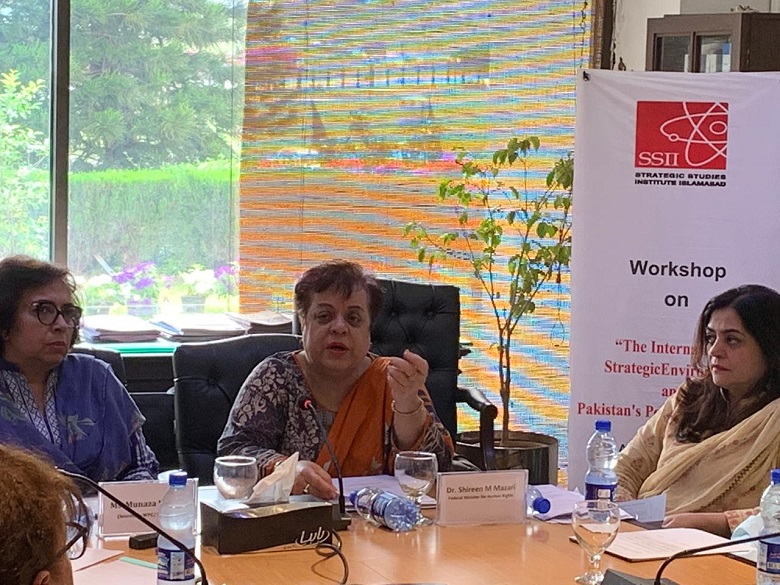ISLAMABAD, Pakistan: The Federal Minister for Human Rights Dr Shireen Mazari has cautioned against the United States’ push to make India a member of the Nuclear Suppliers Group (NSG), making it clear that India’s membership would put Pakistan at a severe disadvantage.
While addressing on the second day of Strategic Studies Institute Islamabad’s (SSIS) workshop titled: “The International Strategic Environment and Pakistan’s Policy Imperatives” organized for Women Parliamentarians in Islamabad on Thursday, Dr Shireen Mazari gave an overview of the non-proliferation and arms control regimes, while drawing attention to Pakistan’s nuclear policy.
Dr Mazari also noted that India’s rapid modernisation of its nuclear forces is adversely affecting the strategic stability in the region.

In the non-proliferation regime, Dr Mazari highlighted two approaches; a US-centric discriminatory approach and a universal non-discriminatory approach. She pointed out article 6 of the Non-Proliferation Treaty (NPT) was inherently discriminatory as it called on the five recognized member states to act “in good faith” towards nuclear disarmament- however the article remains non-binding. She also noted that the NPT did not focus on vertical proliferation, while stressing on horizontal non-proliferation.
Dr Shireen Mazari highlighted Pakistan’s position on the Fissile Material Cut-off Treaty (FMCT) that is currently being negotiated at the Conference on Disarmament. She stressed on Pakistan’s position to have member states reduce their existing stockpiles of fissile material before capping its future production. Without the reduction of existing stockpiles of fissile materials, suspending its future production would leave Pakistan at a disadvantageous position relative to India’s larger nuclear stockpiles.
While discussing the non-proliferation issues, Dr Mazari criticized the trend post 9/11, where international focus was shifted from non-proliferation of nuclear weapons to nuclear programmes of certain countries like Iran and Pakistan.
Discussing India’s nuclear posture, she indicated that India is enhancing its nuclear triad- namely its capability of launching nuclear weapons from land, air and sea. She noted that India has also retreated from its commitment on the No First Use policy in 2004, claiming that it reserved the right to use nuclear weapons against any WMD (Weapons of Mass Destruction) attack. She also noted that India’s rapid modernisation of its nuclear forces is adversely affecting the strategic stability in the region.
The federal minister discussed Pakistan’s nuclear doctrine, and how it rests on maintaining a credible minimum deterrence. She argued India’s Cold Start Doctrine- a strategy to engage Pakistan into a limited conflict, but under Pakistan’s nuclear threshold- is effectively countered by Pakistan’s successful development of its short-range ballistic missile, Nasr, which is able to plug the gap at the tactical level of war. In response to India’s BMD system, Pakistan has also test-fired Babur-III submarine launched cruise missile (SLCM) and Ababeel surface to surface ballistic missile capable of delivering multiple warheads using Multiple Independently-targetable Re-entry vehicle (MIRV) technology. The Babur-III SLCM provides Pakistan a credible second-strike capability.
In order to avoid an arms race in the South Asian region, Dr Mazari informed the audience that Pakistan had earlier proposed several suggestions to India, including a moratorium on nuclear testing which India refused. Pakistan also suggested India establish a strategic restraint regime in the region which the country again did not accept.
While highlighting Pakistan’s role in arms control and disarmament, Dr Mazari noted, prior to 1998, Pakistan had repeatedly introduced a resolution at the UN regarding a nuclear-weapons free zone in South Asia. Pakistan had also offered India to renounce the development of nuclear weapons in the region, but no initiatives were taken on these proposals. Pakistan signed the international convention on nuclear safety in 1997 as a part of the country’s commitment towards the non-proliferation regime. After the nuclear tests in 1998, Pakistan Nuclear Regulatory Authority (PNRA) was created as a competent and independent body for the regulation of nuclear safety, radiation protection, transport and waste safety in Pakistan.





